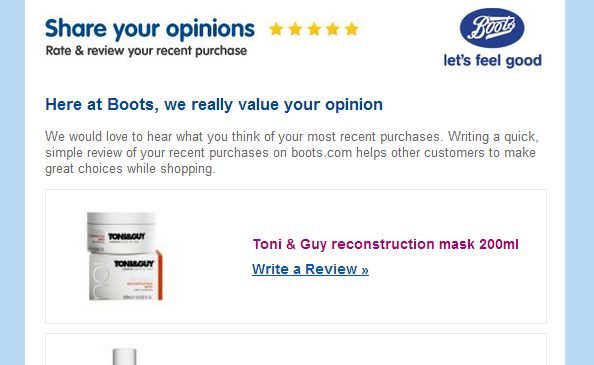Earlier this week, Boots wrote to me to garner my reviews on some purchases a made recently (see my blog on online shopper’s needs). I get excited about this sort of thing because it shows just how engaged some retailers are getting in leveraging their relationship with their shoppers. But as a consultant to CPG manufacturers it leaves me asking “who’s leading your shopper marketing strategy?”
In this case Boots is not just gathering information about the products I’ve bought, but they’re also learning about me. This will help them target products at ‘shoppers like me’ and potential target me with products that ‘shoppers like me’ bought. If done effectively, Boots will be able to secure both greater basket spend AND the opportunity to drive margin directly and indirectly. Direct margin gains will be made by targeting higher margin products at shoppers; indirect margin gains will be made by selling target shoppers to manufacturers. The net outcome is that Boots can increasingly lead their vendors’ shopper marketing strategy.
Should retailers lead your shopper marketing strategy?
When retailers get leadership over how a category, and the brands within it, are marketed to their shoppers, they gain leverage on brands. There’s nothing new in this. Ever since the dawn of category management in the late eighties, retailers have secured a position of relative power over their manufacturing partners.
They can use this power to secure higher shares of a manufacturers sales and drive greater margins as a result. This creates a problem for brands. Boots in this case will have their own strategy which they’ll seek support for, but other retailers, for instance Superdrug to use a UK-based example, will have differing and naturally competitive strategies. This means that brands need to adapt their strategies to fit the retailers’ needs, rather than those of their consumers. This is problematic because retailers have a very different view of the shopper than manufacturers do.
A retailer’s view of the shopper
Retailers have a warped view of their shoppers because they can only see what shoppers do in their outlets. This is at the exclusion of what shoppers do in other outlets and of the consumer behavior that shoppers support. Shoppers only buy products to support a consumer need.
Take the Toni and Guy product I bought in the picture above. I don’t use this product – my wife does. I’m not the target consumer for this product – my wife is. Unilever (who make the product) knows this. Further they know that encouraging more consumers like my wife to use their product is the key to un-tapping growth from this particular segment. They know that in most cases, my wife will buy this for herself and that when men like me buy Toni and Guy products, we are usually doing so on instruction, not on impulse.
Boots does not know this. Oddly when they ask about usage of the product (as they do when gathering reviews) they ask how often product is used, not who uses it. They do know about me, and they know I buy a product which I like and which gets used regularly and they know I’ve bought the product in their online store. Follow this to its logical conclusion and they’ll create a segment of shoppers who they assume are also consumers. Then, they’ll try and sell the opportunity to market to this segment back to Unilever and their competitors.
This warped view of the shopper could lead to miss-marketing and waste.
A manufacturer’s view of the shopper
It seems ironic that a manufacturer should have a clearer view of shoppers’ behavior than a retailer, but in fact this is the case. The best marketers should have clearly defined consumer segments which they wish to target. They should then overlay equally well-understood shopper segments onto this consumer segmentation to define target shoppers. Against these target shoppers marketers can prioritize the channels and marketing activities which are most likely to reap the outcomes they want for their brands. The result? Unilever should be able to educate Boots and not vice versa.
Marketers should lead in shopper marketing strategy
The success or failure of a brand does not depend on its performance in your best customer. It depends on the volume of consumers who use the brand frequently and in the right volumes. Shoppers are the key to this because whether they buy for themselves or others, they make the product available to those all-important consumers. Allowing a trade partner, no matter how influential to lead shopper marketing strategy is therefore a huge risk.
Too few marketers take on full accountability for the way their products are marketed in retail and this ought to change.
Taking accountability for shopper marketing strategy demands that the Marketing function develops insights into both consumer and shopper behavior; that Marketing takes and active role in prioritizing retail channels and in providing strategic support for the Sales function to leverage relationships with trade customers more effectively. This is an organizational challenge for those companies who place Shopper Marketing within the sales function but it’s a necessary challenge if such companies wish to grow in the future.
Contact me if you want to discuss how you might lead your shopper marketing strategy in the future.
